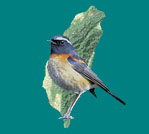 |
|
||||||||||||
|
|
|||||||||||||
 |
|
||||||||||||
|
|
|||||||||||||
|
Endemic Species White-whiskered Laughingthrush
Yellow Tit
Endemic Sub-Species
More Birds in Taiwan
|
Collared Bush-RobinTarsiger johnstoniaeEndemicThe Collared Bush-Robin, Tarsiger johnstoniae (formerly Erithacus johnstoniae) is a small bird approximately 13 cm long. The male has a black head, neck, and back; a bright, reddish-orange hind collar and bar across the scapulars, and long, narrow white supercilium. The female lacks the male’s bright colors; she is olive-gray above and yellowish-buff below, with a less prominent supercilium. Juvenile birds are streaky brown with buff supercilium.
Collared Bush-Robins inhabit
coniferous and broadleaf forest undergrowth in high mountains. They are
most often seen alone or in pairs, on mountain tracks and roads, although
they will utilize low perches when available. They are fairly common on
Mount Ali (A Li Shan), in Chiayi
County, which is why they are sometimes called "Mount Ali robins." They are also found
in similar forest habitat, at 2000 to 2800 m elevation, on other
mountains. Their food consists of caterpillars and insects. Male Collared Bush-Robins are highly territorial. Their typical call sounds like "pi, pi, pi…" and ends in two or three deep throaty sounds; however, when on guard, their warning calls sound like "ga! ga! ga!" Collared Bush-Robin breeding season begins in May and lasts until July. The female builds the nest, mostly of moss, roots, grass, ferns, and hay, in rock and tree cavities within 5 m of the ground. After laying a clutch of two to three eggs, she incubates them while the male guards the nest. After the chicks hatch, both parents care for them.
Reference: The Complete Guide to Birds in Taiwan, by Jin-yuan Wang
|